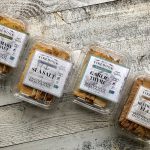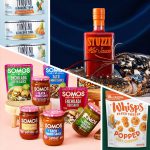Kroger and Sprouts Address Amazon Deal
For now, it will be “business as usual” for Kroger and Sprouts in the wake of Amazon’s acquisition of competing grocery chain Whole Foods Market, both retailers’ CFOs said during presentations this week.
In previously scheduled appearances, Sprouts CFO Brad Lukow presented at the Jefferies 2017 Global Consumer Conference Tuesday and Kroger CFO Michael Schlotman addressed investors at the Oppenheimer Annual Consumer Conference Wednesday. Schlotman addressed investors again during Thursday’s annual shareholders meeting.
Though their talks didn’t focus on Amazon’s Friday announcement that the online retailer is acquiring Whole Foods for $13.7 billion, that didn’t keep the elephant out of the room.
In response to a question from an analyst about the possible effect the deal could have on Kroger, Schlotman told the Oppenheimer Consumer Conference crowd he thinks it will be “interesting” to see how the merger evolves. “I really wouldn’t speculate on a merger that’s out there like that,” Schlotman said. “But I’m guessing [Amazon] didn’t buy Whole Foods to be a natural organic grocer.” He added that he does not view the takeover to be a market “consolidation.”
Schlotman did not address Amazon in today’s shareholder meeting, but did note the company’s history of evolution and the continued value it puts on the human connection, both in stores and on its developing online platform.
“As we all know, there is a lot of change going on in the food industry,” he said. “We are confident that our focus on the customer will enable us to compete and win in the future.”
Lukow had more to say on the deal, given that Sprouts has a partnership with Amazon’s Amazon Fresh with more than 10 stores across two states.
“We partnered with Amazon, but we were very clear in the contract that should either party decide to end the relationship there is a long transition period to give ample time to redirect to another platform,” he said. “And it’s obviously just been a couple days since the [Whole Foods] announcements. I think we will sit back and contemplate what this means and make the right decision from the Sprouts standpoint and I’m sure Amazon will do the same. But at this point, the preliminary discussions, the initial discussions we had with our APN team is, they were surprised by it and they said, ‘it’s business as usual.’”
As for the deal’s impact on the broader state of grocery, Lukow said “that remains to be seen.” He added that the retailer is currently not considering Whole Foods as a competitor when it comes to pricing.
“Obviously, I think there would be price investments,” Lukow said. “But when we look at our price delta with Whole Foods, it’s, shall we say, quite meaningful. And when we price …we’re pricing against the nearest conventional competitor. Whole Foods is not showing up on the radar screen because they’re just dramatically higher [in] price.”
Pricing is not the only differentiator Lukow noted between the two natural retailers.
“We are going after the broad demographic in the U.S., median household income,” he said. “And when we look at where a Whole Foods customer is located, it’s much more upscale. And so much less overlap because, fundamentally, we’re going after different customers.
Whole Foods CEO John Mackey did hint at some changes in the company’s town hall on Friday. Still, it’s unclear exactly how the online giant and natural grocery leader will utilize and adapt each other’s resources and operations, potentially impacting the entire landscape for grocery retailers as a whole.













